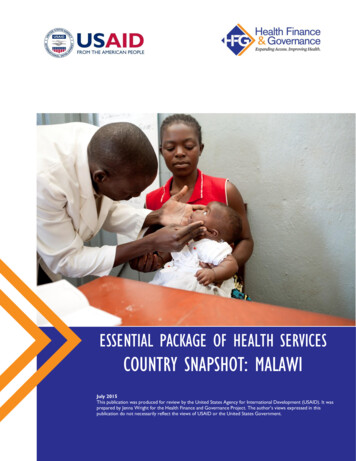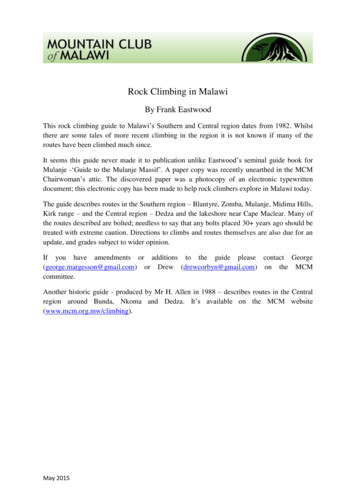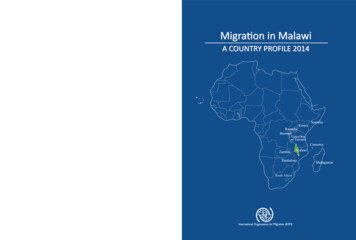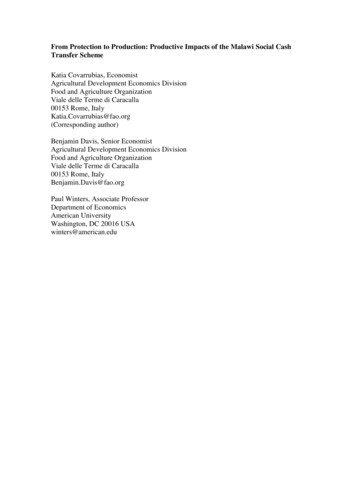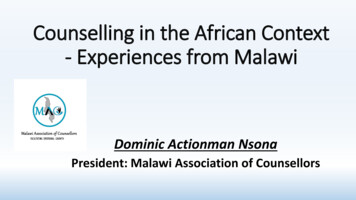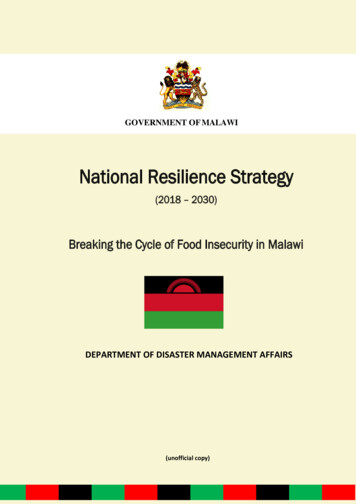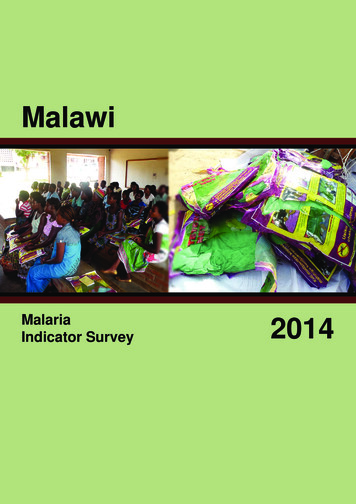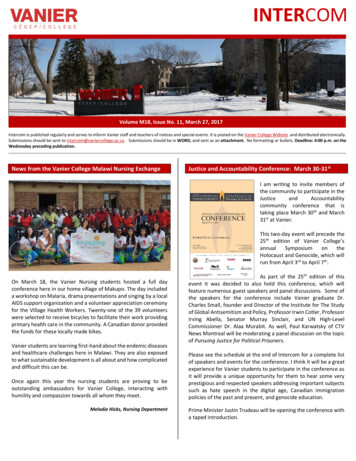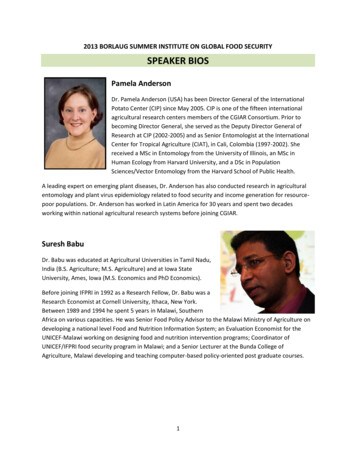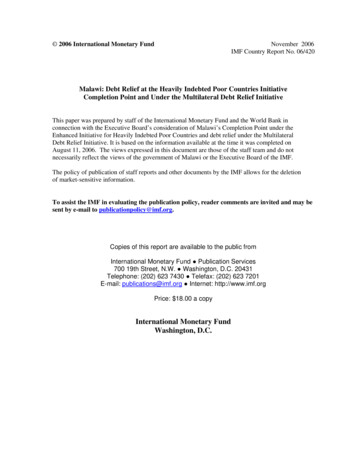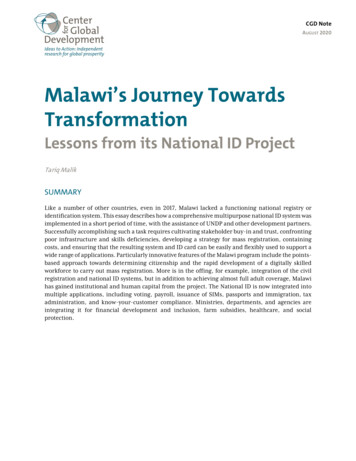
Transcription
CGD NoteAUGUST 2020Malawi’s Journey TowardsTransformationLessons from its National ID ProjectTariq MalikSUMMARYLike a number of other countries, even in 2017, Malawi lacked a functioning national registry oridentification system. This essay describes how a comprehensive multipurpose national ID system wasimplemented in a short period of time, with the assistance of UNDP and other development partners.Successfully accomplishing such a task requires cultivating stakeholder buy-in and trust, confrontingpoor infrastructure and skills deficiencies, developing a strategy for mass registration, containingcosts, and ensuring that the resulting system and ID card can be easily and flexibly used to support awide range of applications. Particularly innovative features of the Malawi program include the pointsbased approach towards determining citizenship and the rapid development of a digitally skilledworkforce to carry out mass registration. More is in the offing, for example, integration of the civilregistration and national ID systems, but in addition to achieving almost full adult coverage, Malawihas gained institutional and human capital from the project. The National ID is now integrated intomultiple applications, including voting, payroll, issuance of SIMs, passports and immigration, taxadministration, and know-your-customer compliance. Ministries, departments, and agencies areintegrating it for financial development and inclusion, farm subsidies, healthcare, and socialprotection.
nment of MalawiNational Registration BureauMalawi Electoral CommissionBiometric Registration KitInformation and Communication TechnologyNational Registration and Identification SystemNational Database and Registration Authority - PakistanCivil Registration and Vital StatisticsMinistry of HealthUnited Nations Development ProgrammeUnited Nations2MALAWI’S JOURNEY TOWARDS TRANSFORMATION
PREFACEMalawi is a poor country with limited physical infrastructure and human capacity. Until recently, itlacked a foundational system to register its citizens and identify them. Many other poor countries arein a similar situation; like Malawi, they often rely on a combination of traditional local systems andfunctional programs such as voter cards and driver’s licenses that both performs poorly and incurs thecosts of multiple disjointed systems.Malawi’s experience in moving from what was initially conceived as yet another one-off voterregistration towards the rapid implementation of an integrated, living, national ID is of great interestto other countries. It shows the importance of developing stakeholder consensus and trust andeffective planning, as well as a number of innovative approaches towards common problems. It alsoshows how the youth of Africa can be engaged in such technology-intensive projects and how they cangenerate spillovers and enhance future opportunities, including for people with disabilities and otherdisadvantages.This is the story of Malawi’s National ID Project as narrated by Tariq Malik, chief technical advisor toUNDP, who spearheaded this project, to Alan Gelb and Kyle Navis at the Center for GlobalDevelopment. In 2018 CGD encouraged further research to update information related to the project.While some information is taken from UNDP public websites, this document should not be regardedas the official narrative of the project by UNDP.Tariq Malik is the former chairman of NADRA, Pakistan’s ID Agency, which is recognized as one of theleading identity management institutions in the world. He has worked with leading developmentagencies including UNDP and the World Bank. In November 2009 he was awarded the ID OutstandingAchievement Award at the Global Summit on Automatic Identification in Milan, Italy. He received oneof the highest awards in IT, Sitara-e-Imtiaz (Star of Excellence), from the president of Pakistan in 2013for innovative citizen-centric ICT application and services rendered for the state of Pakistan.Alan GelbSenior Fellow and Director of StudiesCenter for Global Development3MALAWI’S JOURNEY TOWARDS TRANSFORMATION
I. INTRODUCTIONIn 2017, Malawi was one of the only countries in the Southern African Development Community(SADC) and Common Market for Southern and Eastern Africa (COMESA) without a functioningnational registry and identification system. This essay chronicles the story of how UNDP, thegovernment of Malawi (GoM), and their donor partners (UKAid/DFID, Irish Aid, USAID, the EuropeanUnion and the government of Norway) managed to achieve universal ID coverage in a short span oftime, with a focus on the policy and management lessons for similar projects in other countries.First, it is worth revisiting the question: Why is a legal identity such an important goal? Globally, World Bankdata suggest that an estimated 1 billion people are unable to prove their identity, with most of thesecoming from poor, rural households. While citizens of developed countries often take legal identitycoverage for granted, this infrastructure is vital for lifting people out of poverty, ensuring socialjustice, and providing health benefits, among other things. This has been recognized: SustainableDevelopment Goal (SDG) 16, Target 9 acknowledges the centrality of identity and calls for countries to“by 2030 provide legal identity for all, including birth registration.”Having a legal identity provides an enabling infrastructure for many other SDG goals, including socialprotection (1.3), access to economic resources (1.4), empowerment of women (5.A/B), and reducingcorruption (16.5). There are also universal financial access goals—that by 2020 everybody has access toa transaction account or electronic financial instrument. Likewise, the civil registration and vitalstatistics goals aim to increase the proportion of countries that have achieved 100 percent birthregistration and 80 percent death registration. Additionally, World Bank goals aim to end extremepoverty and boost shared prosperity, particularly for the poorest 40 percent of the population, whilealso improving service to the most vulnerable populations, and there are further goals set by othermultilateral organizations. 1 This overlap in goals among many diverse institutions and playersestablished a concrete opportunity for partnership and laid the foundation for what we were able toaccomplish in Malawi.This essay lays out the story of how the UNDP team with its development partners achieved universalID registration in Malawi, the challenges we faced, the roadblocks, how UNDP coordinated with otherstakeholders and community development partners, and highlights the synergies that helped usachieve success .II. MALAWI: BACKGROUND AND CONTEXTMalawi faced a structural development challenge in the absence of a comprehensive and accuratesystem of national identification. This gap undermined most citizens’ right to identity withmultisectoral consequences. It created uncertainty surrounding their access and entitlement toservices. Equally, the absence of a centralized and up-to-date national register has led to a fragilecapacity for evidence-based planning, beneficiary and service targeting, and accountableUniversal Financial Access Goals: By 2020, adults globally have access to a transaction account or electronic instrument to storemoney, send and receive payments;CRVS Goals, Target #17.19.2: Increased proportion of countries that have achieved 100 per cent birth registration and 80 per centdeath registration;World Bank Group goals: Ending extreme poverty and boosting shared prosperity, while also improving service delivery14MALAWI’S JOURNEY TOWARDS TRANSFORMATION
administrative systems. The lack of a national ID system had negative effects, which included sevenkey concerns that the Malawian government wanted to address: non-Malawians abusing the free national health care systemconcern over ghost workers in public payrolls and ghost pensionerscorruption, facilitated by difficulties in linking the assets of criminals to the proceeds of crimechronic non-repayment of loans in the education sectorthe lack of real-time data to assist disaster response managementhigh and recurring costs associated with beneficiary targeting and service delivery undersocial protection programsWhen we started this project, Malawi had perhaps 2 to 3 percent coverage for birth registration, whilenational ID registrations totaled only some 55,000 people out of an estimated adult population of some9 million. There was a very preliminary civil registration system established by US funds through theCenters for Disease Control and Prevention, which had produced approximately 40,000 birthcertificates by January 2017. Previous efforts to initiate national ID registration had led to fragmentedinitiatives, creating costly or unsustainable silos of information, while also imposing institutional andtechnical obstacles for interlinking information.For example, with each election in Malawi, efforts would be put forth to register everyone, issue a votercard good for four years, and then have to repeat it again for the next election cycle. Similarly, tobaccofarmers were registered biometrically, but the database to manage the system was not used optimallyfor the provision of subsidies and loans. Drivers licenses also utilized biometric technology. There wasthus no shortage of ID programs, but the siloing of these different systems meant that their data couldnot be centrally merged and enrollments de-duplicated. Together, the separate costs of each initiativereached a higher total than the cost of a national project.With these benefits evident to so many programs and stakeholders, it might have been expected thatmost, or all, would buy into a common project. Indeed, the wide-ranging benefits from implementinga successful universal registration were substantial enough to attract a wide range of partners.Nonetheless, shared goals do not automatically translate to action without significant coordinatingefforts.III. CULTIVATING STAKEHOLDER MOTIVATION AND BUY-INOne of the most important factors determining the success of this project was the overlap inmotivation and incentives for a diverse array of stakeholders and development partners. However,taking the time and effort to transform these parallel interests into organizational synergies was justas important to the outcome of this project, if not more so.The initial impetus for the project came from Mia Seppo, the Resident UN Coordinator in Malawi whowas phenomenal in developing a shared desire among development partners to make a concertedpush towards universal ID coverage. Irish Aid was the first to initiate the process of ‘Proof-of-Concept’in Malawi. A year-long process of meetings with the various government ministries took place to bringthem onboard, explaining the uses of ID, its social value, how much it would cost, and generallybuilding customized cases for the importance of this initiative. We were fortunate to face a favorable5MALAWI’S JOURNEY TOWARDS TRANSFORMATION
political situation, with elections coming in 2019 that motivated the incumbent government tosimultaneously register voters, demonstrate tangible development progress, document economicgrowth, and address corruption. While GoM and its development partners comprised the primarydrivers of this project, other groups with an interest in the outcomes included individual citizens andthe private sector.Cost SharingThe total cost of the project came to US 52 million, funded by GoM, DFID, Irish Aid, USAID, thegovernment of Norway, the EU, UNICEF, and UNDP. Initially, a cost-sharing agreement wasconfirmed, with GoM agreeing to contribute 50 percent of the costs and development partnersproviding the balance. GoM later negotiated their monetary contribution down to 40 percent, citingin-kind contributions such as providing security and transportation. 2 With funding in place, the workof developing stakeholder buy-in could begin.StakeholdersThe most important stakeholders in this entire project were the citizens of Malawi, who would receivea legal identity and thereby smooth access to a number of services, benefits, and products that requirethe ability to prove and assert one’s identity. When I took over the project in January 2017, I went outto the public and spoke to common people—shopkeepers, vendors, donut-selling women—andcommunities like faith-based organizations, political parties, media, and other special interest groupsrepresenting citizens. I found an identity quest, subtly wrapped in human rights issues—right to vote,social justice, and gender balance. That was enough to sense the demand for identity.As noted earlier, GoM provided both the political impetus and the legal framework for pushingforward with this project. Credit goes to the team lead by the UN Resident Coordinator withAmbassadors of donor countries to convince the government to move forward urgently. Theincumbent government had an interest in delivering results, while the opposition had severalconcerns. I met with parliament and fielded around 50 questions from the opposition, explaining theproposal and the system to them; this helped to bring them onboard as partners in its implementation.They grilled me hard, especially on use of ID allegedly to rig the elections. This was surprising for me.ID is used worldwide to come up with clean voters lists to underpin “One Person, One Identity, OneVote” and combat electoral fraud. I explained this to the political parties, sharing my experiences inother countries that role of National ID is prior to elections, to come up with transparent electoral roll,displayed for public scrutiny. The outcome of that meeting was fantastic—a national consensus on theimplementation of a National Identity Card aimed at empowerment of the people.From a legislative perspective, the Malawi National Registration Act entered into force in August 2015,requiring all Malawians 16 years of age and older be included in a national registry and be issued anidentity card. The act also created the National Registration Bureau (NRB) to manage both civilregistration and registration for the ID program. Many countries assign civil registration to thepurview of local governments, but the NRB is a federal agency tasked with both responsibilities.2 As of early 2017, the development partners had increased their contributions to a share of around 67 percent inresponse to budgetary concerns from GoM.6MALAWI’S JOURNEY TOWARDS TRANSFORMATION
Demonstrating the revenue-generating possibilities to the NRB helped develop their interest in theproject. I showed them how the system could provide opportunities for developing a sustainablerevenue source by charging small fees for identity authentication at points of service, such as openinga bank account. Case studies from other countries demonstrated proof-of-concept and feasibility,such as India’s Aadhaar platform and my own experience at Pakistan’s National Database andRegistration Authority, which relies on service charges to fund its operations. Other departments—including the Malawi Electoral Commission (MEC), Malawi Revenue Agency, Ministry of Education,Science and Technology, and Reserve Bank—saw obvious benefits from our proposal. The Departmentof Immigration and Passport Office under the Ministry of Home Affairs was keen to link the nationalID with the passport issuance process and embed it within a border management solution to ensuresecure borders. Some departments were so eager to begin utilizing the ID systems after registrationthat we had to ask them to delay until the cards had been distributed in 2018.Development agencies were particularly interested in realizing this project, and, as it progressed,other institutions saw potential benefits and joined in. For example, UNICEF was not initially part ofthe planning stages, but when it became clear that children’s data would be collected, they joined foran additional round on the project. Likewise, I was contacted by several other institutions in thedevelopment community which were looking to utilize IDs for service delivery. One example wasGiveDirectly, an NGO that specializes in providing direct transfers to the poor. Robust and uniqueidentification is clearly essential for such programs to operate efficiently. Others such as theGesellschaft für Internationale Zusammenarbeit (GIZ) and the Clinton Foundation also showedgreat interest.The private sector was also an enthusiastic booster for this project. We often had to ask them to delayimplementing ID requirements until we achieved sufficient coverage. Three groups expressedparticular interest. First, banks recognized immediately that universal ID coverage provides thenecessary underlying infrastructure to successfully offer a range of financial products, particularlycredit. Second, universal ID coverage makes it much easier for mobile money operators to comply withknow-your-customer legal requirements. Third, tobacco farmers could build their own wage andsubsidy delivery mechanisms off a universal ID system, rather than having to implement their own,more costly, solutions.IV. PLANNING STRATEGICALLYThe agreed-upon timeline called for us to finish planning by the first quarter of 2017, with massregistration to be completed by the end of the year. We estimated that we would need to register ninemillion Malawians, with all ID cards to be distributed by 30 June 2018, and to have the NationalIdentification and Registration System transitioned to NRB by the end of 2018.The implementation team was led by me and consisted of a core team of 19 members that constitutedfull-time UNDP staff. We hired 4,200 registration officers (RO)—young Malawians, mostly from collegeand universities of Malawi—to work on the ground. Between the government and developmentpartners, we had around 4,500 people involved in this project over six months.The registration period was supposed to begin in mid-June, but I pushed the project implementationearly. When “proof-of-Concept’ was successful, there was no need for pilot. I don’t feel comfortable7MALAWI’S JOURNEY TOWARDS TRANSFORMATION
with pilot projects. My experience is that if you become too focused on the pilot, it becomes the projectin itself and the primary project waits for an indefinite time in search of perfection. Paying moreattention to the minutest details during planning pays off more than running a pilot. A proof-ofconcept was already done; hence I didn’t see the need for a pilot. The result: we were able to begin inMay 2017 and finished the final registrations early, on 24 November. In a record time of 180 days, 9.1million citizens were registered with their biometric attributes! Malawi’s first ever multi-modalbiometric citizen database was established.Throughout the planning stages, we had to make several strategic decisions to overcome a variety ofchallenges posed by the task of registering an entire country with accurate data. We can consider eachof the issues and the choices we made to address them.Trust DeficitIn a project like this, simply taking input from government and development partners is not enough,because the real stakeholders are the average citizens served by those institutions. In seeking out thisfeedback, I encountered a fair amount of skepticism due to the previous failed attempts at massregistration. My discussions with Malawians, shopkeepers in the market, and the people I interactedwith in the street revealed a unanimous opinion that this project would not happen, driven largely bythe experiences of previous failures of the government of Malawi.To combat these negative expectations and build enthusiasm, we launched a robust civic educationcampaign, and carried out a proof of concept for the parliamentarians and civil bureaucrats, makingand delivering the same National ID cards to them. Hence, initially the National ID cards were givento parliamentarian and civil servants after registration of their biometric attributes. This created agoodwill gesture and an impression that this project was doable. But on the other hand, the fact thatthe proof-of-concept phase registered only parliamentarians and civil servants (total 55,000) prior togoing to the masses of people created an impression that the project was for the elites. To avoid thisperception and ensure that we truly believed in leaving no one behind in our goal of universalcoverage, we also maintained consistent contact with the media and initiated meetings with allpolitical stakeholders. These included political parties, and faith-based organizations which play anoutsized role in Malawian democracy. Our commitment to transparency was key to overcoming thetrust deficit that previous failed efforts led by government had left in place.Lack of Infrastructure and the Mass Registration StrategyPhysical infrastructure requirements posed a substantial obstacle to accomplishing a nationwide massregistration campaign. Seventy percent of Malawi lacks electricity. The 28 district offices without anybasic facilities were insufficient to register all citizens, and we did not have the budget to build manymore offices from scratch. We therefore developed a ‘Request for Proposal’ that called for a portableoffice model using 2,000 solar-powered Biometric Registration Kits (BRK) to carry out rapidregistrations. Each BRK includes a digital camera, laptop, fingerprint scanner, card reader, photobooth, solar panel, and other peripheral equipment.We decided to deploy the BRKs in a particular pattern: each region, which consisted of four or fivedistricts, represented a phase, and a phased approach was used to cover the population. All BRKswould be deployed in a first wave in a region to register everybody. Some kits would then be left behindfor continuing registrations, with the rest continuing to the next region. This deployment strategy8MALAWI’S JOURNEY TOWARDS TRANSFORMATION
aimed to combine the benefits of mass registration with the recognition that it would not be possibleto cover everyone at the first attempt.We also established a call center and SMS USSD service in place with two Telco operators to help withcustomer service needs, and a comprehensive complaint redressal system for citizens.Finally, we also needed in-country transportation. GoM committed to providing 800 vehicles as an inkind contribution for the exercise but unfortunately, we had to live with 120 vehicles to conduct massregistration and alter our plan on the fly due to the scarce transportation provided by the government.The BRKs generally performed quite well, although we did have to adjust for their overuse withoutadequate time for battery charging. Typically, the BRKs were started up at 6 am and would be used toregister citizens till dark at 6 or 7 pm, leaving no time to recharge them. Due to the increased demandcreated by the robust civic education campaign, the ROs continued to register citizens from sunrise tosunset in two shifts. As a result, we needed to purchase extra batteries for the BRKs and develop adistribution strategy to get them to the teams in the field. A few BRKs were used very roughly so thatrapid response teams of technicians had to be made available to fix them on the spot.Following the end of mass enrollment, the BRKs have remained in Malawi as a government asset. As ascarce resource, they have created competition between ministries, pushing the ministries to honetheir respective business cases to justify their use. For example, the Health Ministry wants to equip853 of their healthcare facilities with BRKs to collect vital statistics and record live births, and, as notedbefore, the Malawi Electoral Commission is already using these BRKs for its voter registration drive.Lack of Skilled ResourcesEven though there are several international agencies working in Malawi with the goal to train four tofive thousand professionals in information and communication technology (ICT) skills by 2019, askilled work force was not available. We therefore saw an opportunity to use the project to create apositive spillover—to rapidly train a cohort of workers who could provide ongoing support for the IDsystem and its applications. At the end of the project this workforce is still available to contribute incountry’s progress.To streamline the hiring process, we approached local universities and collaborated with consultantsto develop an online-based competency test to identify the best candidates. UNDP with the help ofconsultant prepared job descriptions, while selection and human resources management was to bedone on merit via the online test. We emphasized hiring young Malawians, considering the need toensure gender balance, and to make accommodations for persons with disabilities (box 1). The crashtraining course included creating a sense of mission—evangelizing why ID is important, and why theproject was a patriotic undertaking, on top of skills training. Developing the training curriculum wasa project unto itself. We had to create digital audio and video content from scratch and ended upbooking all the hotels in the capital of the country—Lilongwe—for three months to carry out thetraining.When we talk about linkages, we must also recognize that many government departments andministries will need a workforce to be able to work with the ID system once it has been established andtaken over in full by the NRB. That alone was calculated to require a staff of hundreds of trained skilledtechnical staff to manage the ID program going forward. In addition, border management and9MALAWI’S JOURNEY TOWARDS TRANSFORMATION
security, the immigration department, airports, the revenue and tax authority, the trafficdepartment, banks—all will need technically competent workers to incorporate the unique ID systeminto their own digital infrastructure. The same workforce is now being used for the voter registrationdrive and in the census exercise. We can reasonably expect this workforce to become a backbone ofMalawi's increasingly digitized economy. In addition, nearby Zimbabwe, Mozambique, Zambia,Nigeria, Tanzania, Sierra Leone, and Kenya have all embarked on biometric ID programs, whichmeans that this training can potentially open doors of opportunity beyond Malawi’s borders.As a new project, the national ID program offered an opportunity to employ members ofdisadvantaged groups and, equally important, to help demonstrate their potential to society. We tookspecial efforts to ensure fair representation of protected classes, including persons with disabilities,women, and albinos, who face severe problems of discrimination, violence and even ritual murder inMalawi. 3 Among the albinos, this meant we also had to take extra security precautions to guaranteetheir safety. One albino RO who easily passed the online test and was selected, called this experiencean “identity quest,” and a way to prove that albinos can work even better than others. This manmanaged to register 8,000 people, became a BRK troubleshooter, and earned enough money tocontinue for a master’s degree in computer WI’S JOURNEY TOWARDS TRANSFORMATION
Box 1. Demonstrating the Capability of Disadvantaged GroupsDisability Not Inability: John’s Determination to SucceedJohn doing what he does bestWhen Everyone Else Says You Can’t, Determination Says “Yes You Can.”Thirty-four-year-old John Mwangonde from Mwambuli Village in Karonga District was diagnosedwith poliomyelitis at the early age of 6. “When I first lost the ability to use my legs, my familythought I was bewitched so it was a while before I was taken to the hospital where they told us itwas polio and that I was going to stay that way, unable to walk,” John tells.He explains how, after he become a paraplegic, his family could not afford a wheelchair and howhe had to crawl to get around, including going to school. Despite the nearest school being 8kilometers away, John was determined to stay in school. “I saw how a lot of people withpredicaments like mine found it too much of a challenge to get to school and decided to stay athome. Something in me always kept me going even though it was not easy to go to school everyday,” John explains.He explains how his mother kept repeating to him and to his family that he was meant for greatthings and that he would someday become a very important person in their community. Her wordsmotivated John to stay in school, and whilst all his siblings eventually dropped out, he kept his11MALAWI’S JOURNEY TOWARDS TRANSFORMATION
determination and passed his Primary School Leaving Examinations and proceeded to aCommunity Day Secondary School near his home where he was among the top students in his class.“One day, a well-wisher came to our school and saw me. I was the only one in my class with aphysical disability and he said my life story and determination inspired him and he committed topay all my school expenses and facilitated the provision of my first wheelchair,” John tells.Although John’s final grades for the Malawi School Certificate of Education Examination werequite good, he was not selected to the University of Malawi, but he was offered a chance to studyfor a Diploma in Community Development by the Malawi Council for the Handicapped. “After Iobtained my Diploma in Community Development, the biggest challenge I faced was that most ofthe job opportunities that were being advertised in that field required a lot of mobility and for oneto know how to ride a motorcycle, which was not possible for me, so I ended up being unemployedfor a long time,” he explains.According to John, despite his qualifications as a Community Development worker, his passion wasalways in electronic gadgets, and especially in computers. “I knew how to fix things like computers,simply by studying others doing it. I therefore decided to go back to school a
This is the story of Malawi's National ID Project as narrated by Tariq Malik, chief technical advisor to UNDP, who spearheaded this project, to Alan Gelb and Kyle Navis at the Center for Global Development. In 2018 CGD encouraged further research to update information related to the project.
